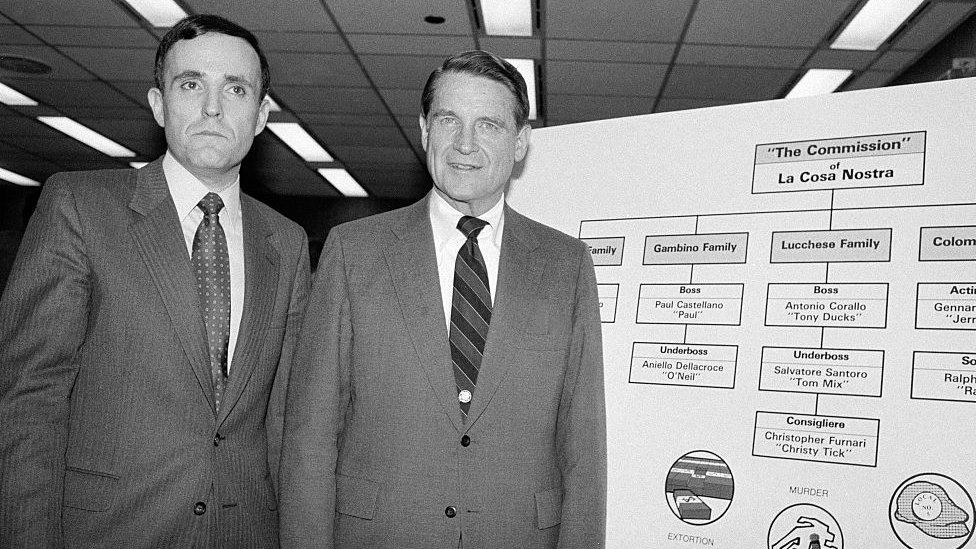
As a federal prosecutor in the 1980s, Rudy Giuliani made headlines around the world for aggressively going after New York’s organised crime families.
To do so, he pioneered the use of a federal anti-racketeering act aimed at prosecuting ongoing criminal “enterprises”.
Nearly 40 years later, the one-time New York City mayor is facing a similar act as a defendant in Georgia’s election inquiry.
Mr Giuliani has denied any wrongdoing.
The act, formerly known as the Racketeer Influenced and Corrupt Organizations Act – or Rico – was passed by Congress in 1970 in a bid to help prosecutors piece together complex cases involving criminal bosses who gave orders and the lower level underlings that carried them out.
In the early 1980s, Mr Giuliani famously used the Rico Act to aggressively target the “Five Families” of New York City’s Italian-American mafia.
Since 1931, the families had been governed by “the Commission”, a national ruling body that oversaw the activities of approximately 1,000 “made” members of the mob and a vast network of several thousand other “associates” across New York, New Jersey and further afield.
The investigation – which involved hundreds of FBI agents and New York police officers – saw extensive use of listening devices, discreetly placed in locations including an East Harlem social club and a mob driver’s Jaguar used to ferry gangsters across the city.
The surveillance effort resulted in hundreds of hours of taped conversations, giving investigators a detailed look at the inner workings of the mafia and how decisions made by its senior leaders in the Commission trickled down to criminal activity on the streets.
Armed with this information, Mr Giuliani took the case to a federal grand jury and, in 1985, obtained indictments against 11 of the mob’s leaders and many of their lieutenants. Eight were eventually convicted and most were sentenced to 100 years in prison.
While Rico prosecutions had been used before – notably against the Hells Angels motorcycle gang in California in the late 1970s – Mr Giuliani and his allies have long lauded its use as one of his prime accomplishments before becoming mayor.
“Using it against the Commission,” Mr Giuliani told the New York Times in 1989. “That was an idea that no one had until I developed it and went down to Washington and started talking about it.”
Nearly 37 years after the Commission trial’s verdicts came down, Mr Giuliani, now 79, is facing Georgia’s version of the Rico act as a defendant alongside former US president Donald Trump and 17 other people accused of attempting to overturn the results of the 2020 US election.
In a dramatic twist, the once popular Mr Giuliani is facing Fulton County District Attorney Fani Willis, who frequently touts the use of the same Rico act that made Mr Giuliani famous as a prosecutor.
“I have right now more Rico indictments in the last 18 months, 20 months, than were probably done in the last 10 years out of this office,” she told the Washington Post in January.
Mr Giuliani has repeatedly denied any wrongdoing. In a Monday statement, he called the Georgia indictment an “affront to American democracy” that does “permanent, irrevocable harm” to the US justice system.
“The real criminals here are the people who have brought this case forward both directly and indirectly,” he said.
This video can not be played
To play this video you need to enable JavaScript in your browser.
Related Topics
This post was originally published on this site be sure to check out more of their content.






